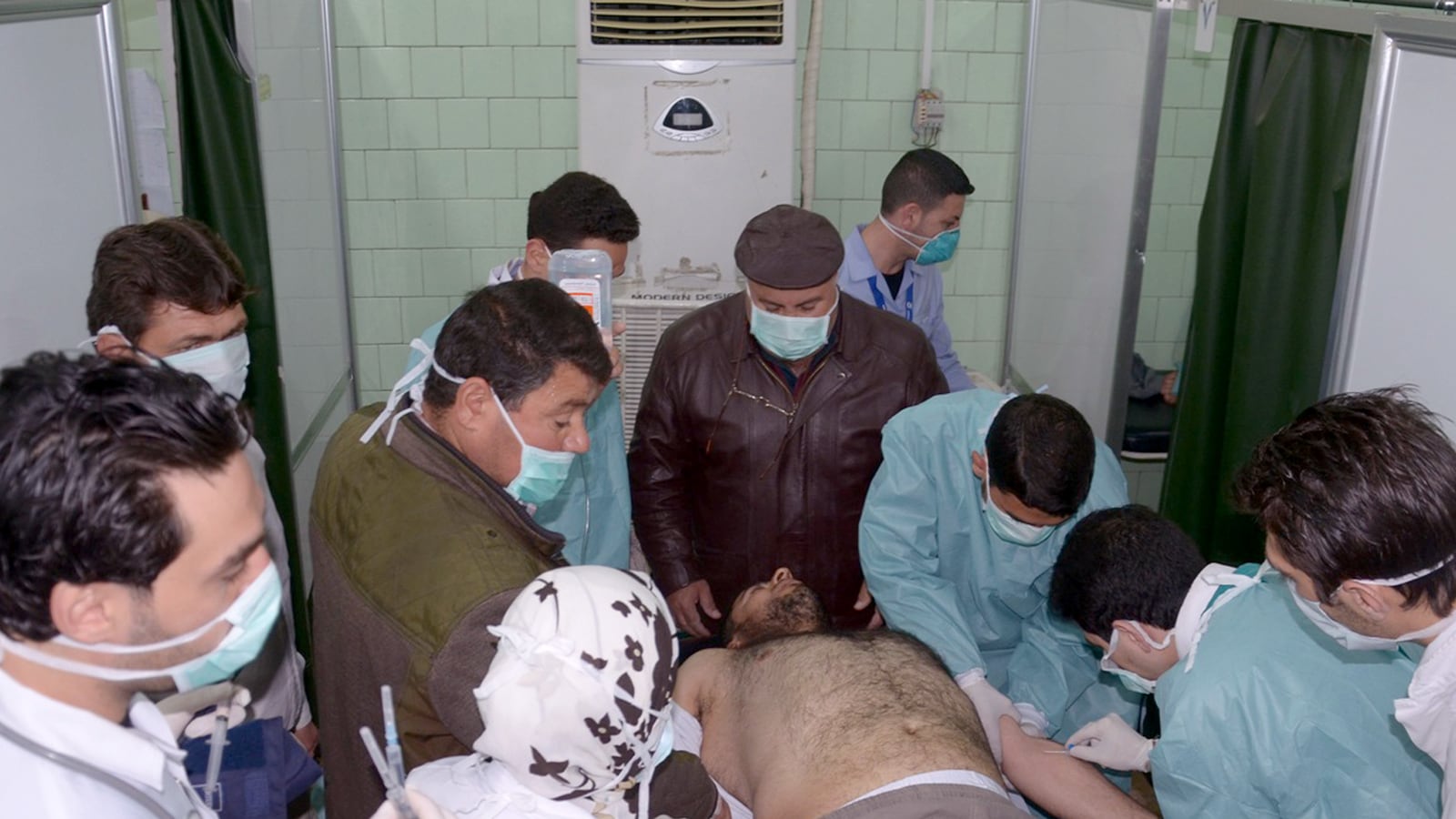On Thursday, after the United States joined several allies in announcing that the Syrian government had likely used chemical weapons against the country’s rebels—on a “small scale,” as Defense Secretary Chuck Hagel put it—many commentators wondered if the Obama administration’s so-called red line on Syria had finally been crossed. And critics of America’s reluctance to wade too deeply into the Syrian conflict said the time for greater U.S. involvement had come. “It is clear that the Syrians have crossed the red line that the president said was a game changer, so it should change the game,” Sen. John McCain told reporters, calling for America to help establish a no-fly zone inside Syria and arm rebel groups.

But the main message from U.S. officials remained one of caution—suggesting that America is still searching for certainty about the alleged attacks. “We are continuing to do further work to establish a definitive judgment as to whether or not the red line has been crossed,” a senior White House official said on a conference call with reporters Thursday night.
This search for definitive proof on chemical weapons will likely take time, analysts say—and given the difficulty of getting reliable information from inside Syria, it may come up short. As the investigation continues, according to several analysts tracking the conflict, America’s Syria policy looks unlikely to undergo significant or sudden change. “The issue is going to be: Can you confirm it? And getting really solid information on it is going to be tough,” said Jeffrey White, a defense fellow at the Washington Institute for Near East Policy. “Until we get that, not much is going to happen.”
In the meantime, White and others say, America’s caution could leave an opening for the forces of Syrian President Bashar al-Assad when it comes to deploying chemical arms, especially in a limited capacity—which makes the use of such weapons difficult to prove. “If Assad continues to use these weapons in a low-level, tactical way, he could get away with it for a while,” White says. “By doing nothing, and by establishing a very high standard of evidence, [America is] giving him some operating room.”
The U.S. government has not provided details on the suspected chemical attacks under investigation, saying only that it has received “physiological” evidence that strongly suggests such attacks have taken place—and that the attacks most likely came from the Syrian military. But the three alleged incidents that have been discussed by America’s allies in Britain, as The Guardian notes, are said to have claimed dozens of victims.
Speaking in Moscow on Friday, Syria’s information minister said publicly that Assad’s forces had not carried out chemical attacks, placing the blame on rebels allied with al Qaeda.
Shashank Joshi, an analyst with the Royal United Services Institute in London, says that America’s caution is warranted, given the difficulties of obtaining reliable information from Syria, and the fact that the evidence America has been provided with appears to be “fragmentary” and limited in scope. But this also puts the Obama administration in a difficult position. “The question is, are you going to get evidence stronger than that? And do you have to wait for a major massacre to take place before you can get it? It’s an unavoidable dilemma,” Joshi says. “You potentially encourage the impression that the regime can get away with a hell of a lot.”
If the Syrian government did use chemical weapons, Joshi adds, it may feel emboldened to continue. “They must have done it for a reason—and that reason must have been military utility,” he says. “That underlying reason will still be present. We may very well see it again.”

Joseph Holliday, a fellow with the Institute for the Study of War in Washington, D.C., and former U.S. Army intelligence officer, says that chemical weapons fit the government’s strategy against the rebels. Assad’s forces have drawn international condemnation for a gradual escalation of attacks—from pounding rebel-held neighborhoods with artillery and then airstrikes to launching ballistic and Scud missiles—that have wreaked havoc on civilians and rebel forces alike. “The Assad regime’s strategy is population displacement: they’re trying to force populations to leave areas under rebel control,” he says. “And what better weapon to do it than chemical weapons? They’re the best weapons to displace populations. Period.”
Holliday compares the alleged small-scale chemical attacks to other atrocities reportedly perpetuated by Assad’s forces such as massacres in rebel-held areas and the bombings of hospitals and bread lines. “It means the insurgents—even when they win territory—don’t win populations, because the populations are forced to flee,” he says. “And in the process they learn to hate the rebels for bringing this upon them.”
The chemical weapons might also possess a simpler, tactical utility for Assad’s battered forces, which have steadily lost ground to the rebels in what is often described as a war of attrition, says Firas Abi Ali, the head of Middle East and North Africa forecasting at Exclusive Analysis, a risk-consultancy firm in London. “There is this tendency to go with the most evil explanation possible when it comes to Assad,” he says. “Not that this justifies the use of chemical weapons in any way, but Assad [likely] thinks it could be explained by military need. Rather than fighting through a large, built-up area [of rebel fighters], he can just use a chemical weapon to disable the [rebels].”
The Syrian military’s use of chemical weapons, Abi Ali adds, will likely depend on what the government thinks it can get away with. “Going forward, what has been established is that repeated, small-scale use of these weapons does not trigger intervention. So we will see more of that,” he says. “It will ebb and flow depending on how much attention [Assad] is receiving. But it’s not going to stop.”
As White, of the Washington Institute, puts it: “This isn’t a game changer for [Assad’s government]. But it does give them another edge. And the regime needs all the edge it can get.”




